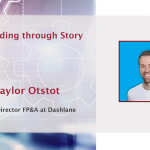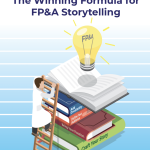In this article, the author discusses the key aspects of FP&A storytelling, highlighting the importance of...

When I was growing up, I loved a TV show called “Mind Your Language.” It was a British TV series about a diverse group of individuals from different countries who joined a school in England to learn English. As expected, there were humorous twists and plots, and it was a hugely enjoyable show. The central topic of this show was that not minding your language can lead to catastrophe. However, the right language, style and storytelling could save the day.
A few years ago, I joined a local chapter of the Toastmasters Club. The Toastmasters Club is a global non-profit organisation that helps its members improve their public speaking and presentation skills. I recollected the abovementioned TV series “Mind Your Language,” as the same principles were reinforced there.
You may be wondering why a finance professional is writing about his experiences at a public speaking club on a global FP&A educational platform. I believe what I learned from this experience applies to the finance world. Public speaking is a critical skill for today’s finance professionals, and the Toastmasters Club is a risk-free, low-cost, supportive platform to sharpen this skill. Let me elaborate.
1. Managing anxiety
FP&A professional’s role was once limited to crunching numbers. You could get your CPA or MBA, fall in love with Excel, and you were on the road to FP&A bliss. Those days are long gone. Today, FP&A is a Business Partnering role, as we are the right-hand people to the business leaders. It is a role committed to driving change and delivering impact, which requires an individual to stand and speak up, sharing his point of view through data and analysis. Visualising your presentation and explaining your operational plan to the Board or providing the strategic rationale for an acquisition can be intimidating for anyone. This is where Toastmasters can help; in a risk-free environment, any individual can learn to manage their anxiety. There are multiple ways to participate: you can deliver a speech, you can evaluate a speech, you can take part in impromptu discussions where you need to think on your feet, you can tell a joke, or you can be the toastmaster of the day and conduct the meeting. Each of these roles helps to manage anxiety in its unique way, as you have to stand up and speak. You will learn to translate your thoughts into logical sentences very quickly. As you practice, you will learn to do this with a smile. These skills can be translated easily into the professional realm. You can train yourself to think and speak logically while managing your anxiety with Toastmasters, regardless of what you work on. For me, Toastmasters has been a unique platform to challenge myself and learn to manage anxiety.
2. “Show Me the Money”
There is an iconic line in the movie “Jerry McGuire” where Tom Cruise enthusiastically and emphatically shouts the phrase “Show me the Money” over the phone. For finance professionals, the tagline should be “Show/tell me the Story”. If anyone is confused, we are in the business of storytelling. In fact, I once introduced my role to a business team as a Director of storytelling. While numbers are the bread and butter of our lives, we are principally storytellers. Whether it is the annual operating plan, the variances from the plan, a new transformation programme, or the launch of a new product, we are trying to tell the story with numbers.
I once asked the CFO of a Fortune 500 company I worked for about how he decided which acquisitions to approve, as they all seemed to have good returns. He told me that he focused a lot on the “story”: why we were doing this acquisition and what the strategic rationale was. He further mentioned that people often didn’t invest much time in telling a compelling story. The same principles are applicable in nearly every area of finance. A speech is a story that you are trying to tell your audience. The best speeches are those that tell the most compelling stories. At Toastmasters, one learns to practice and refine this art. From day one, the more experienced speakers will advise that the better story you can tell, the better and more relatable speech you can deliver.
Indeed, we have to deal with many numbers, explanations and materials to show, but from my experience, we can craft a good story by focusing on the following:
- What happened? (e.g., maybe we had low margins)
- Why did this happen? (Cost of material rose due to short supply)
- How did it happen? (Worldwide shortages)
- What can we do to ensure that it doesn’t happen again? (We can get into exclusive buying contracts)
The above four questions are the same ones we use to craft a story at Toastmasters. Today, we are fortunate to have access to different tools that help us tell our stories: dashboards, slides, pictures or charts.
3. Understand your audience
A speech is about connecting with your audience. An important skill to connect with your audience is to understand them. As one delivers more and more speeches at the Toastmasters Club, one develops a better appreciation of the audience. This skill also translates very well to the business world. Have you been in any meeting where the finance person showed up with a slide full of numbers, and everyone else was just shaking their head, trying to make heads or tails about the presentation? Or have you sat in a meeting where people were too afraid to ask questions as they expected a long-drawn, numbers-heavy, and complex reply? I have certainly sat in these meetings and hopefully led only a few of these. As finance professionals, we love the nitty-gritty of numbers. However, most non-finance folks don’t share this love and prefer simple answers. Developing a better appreciation of our audience will help us excel as finance professionals.
Final Thoughts
Being a good public speaker is a critical skill for finance professionals, and Toastmasters is a wonderful platform to refine this capability. It is a great way to learn how to manage anxiety, develop better storytelling skills and connect with audiences. We should try and mind our language or risk shortchanging ourselves.
Subscribe to
FP&A Trends Digest

We will regularly update you on the latest trends and developments in FP&A. Take the opportunity to have articles written by finance thought leaders delivered directly to your inbox; watch compelling webinars; connect with like-minded professionals; and become a part of our global community.







